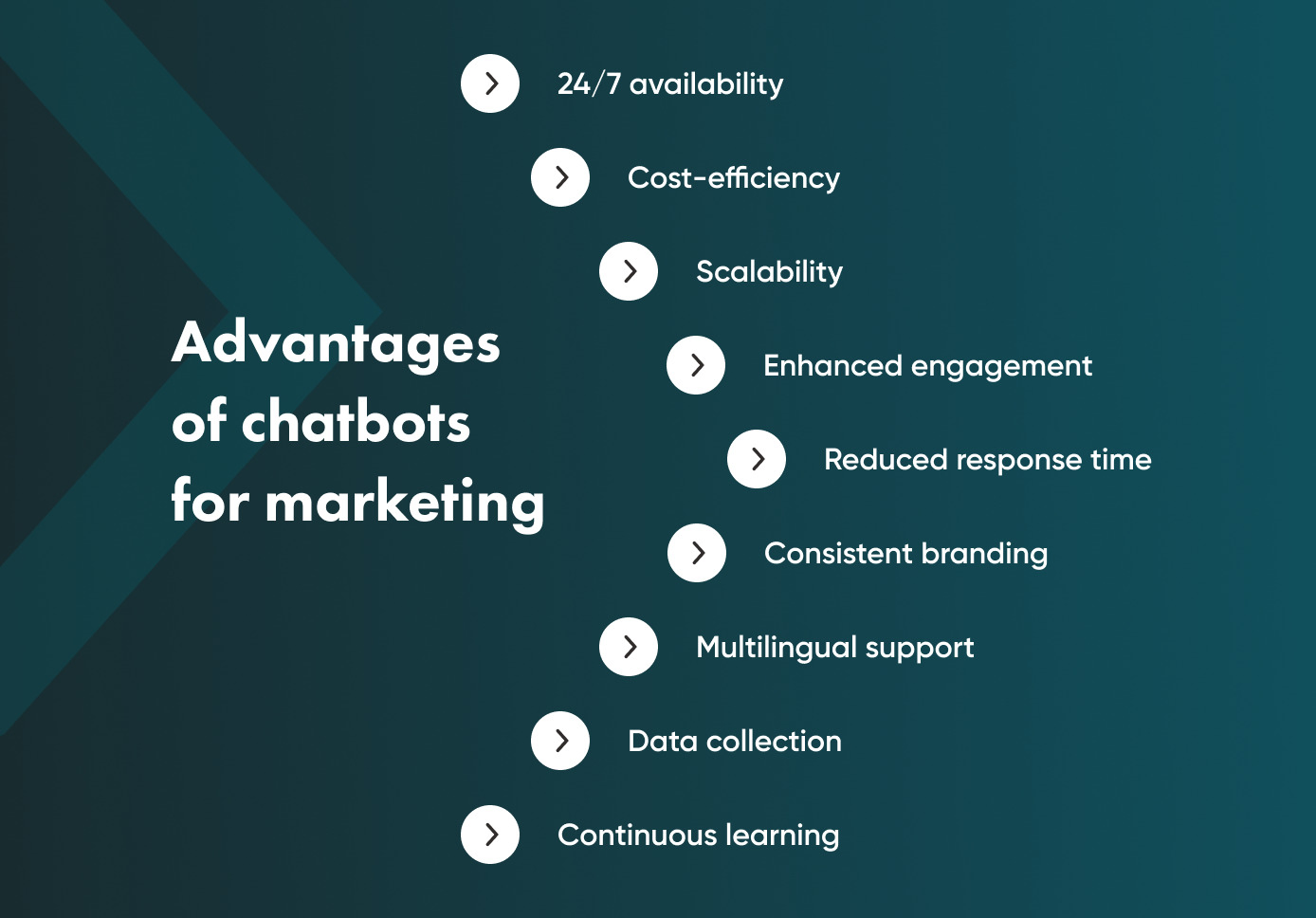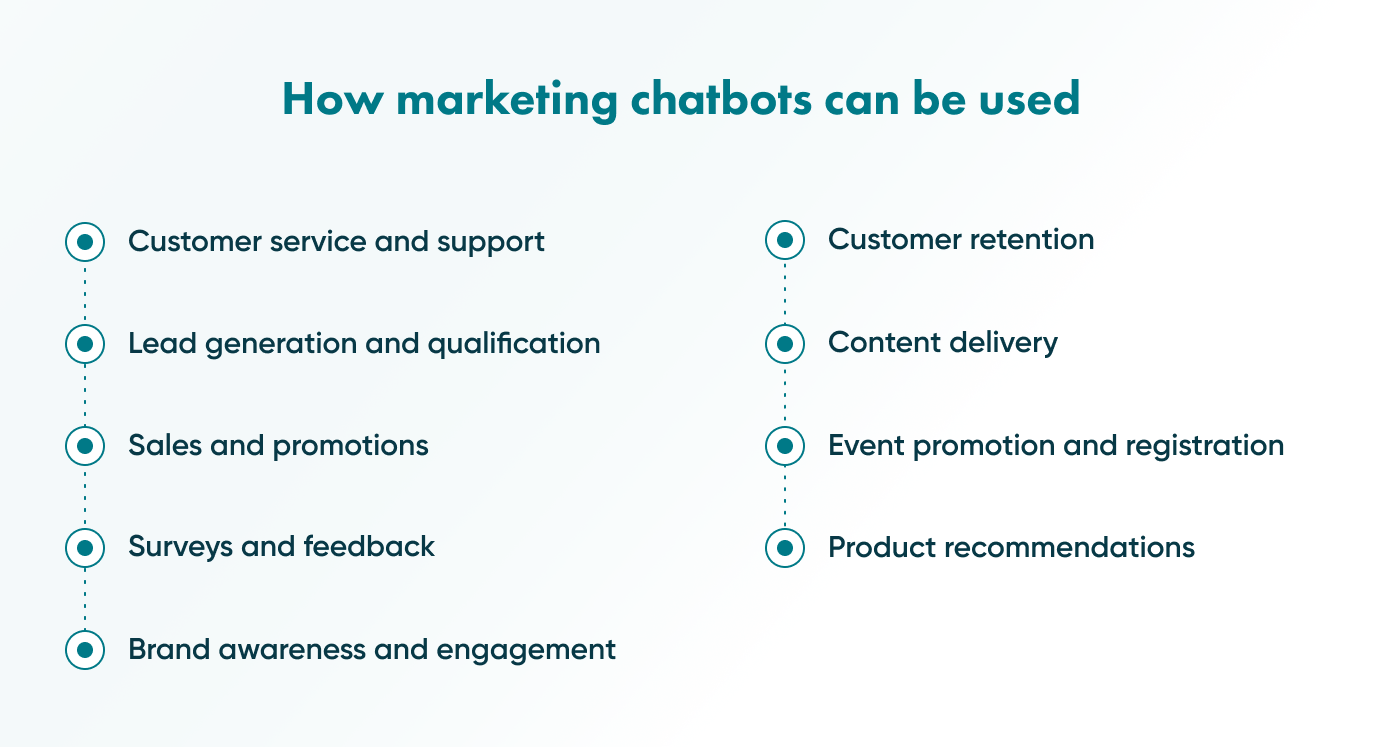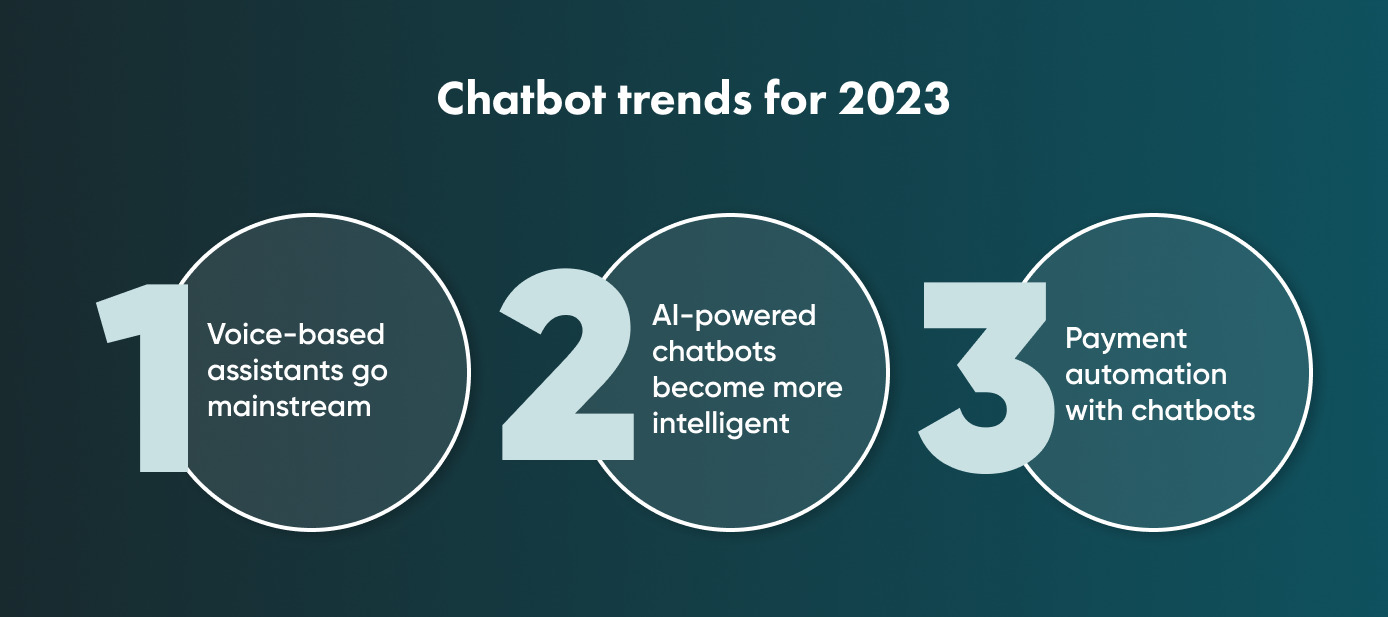The Future of Chatbots for Marketing: How AI is Changing the Industry


In recent years, the marketing field has been revolutionised by the emergence of artificial intelligence (AI). AI has transformed the way marketers approach customer engagement, data analysis, and decision-making.
From chatbots to personalised recommendations, AI-powered marketing tools have enabled businesses to deliver more effective, targeted, and efficient marketing campaigns.
This article will explore the future of chatbot technology in marketing and how AI is changing the industry. We will look at the current state of chatbots, their capabilities, and the potential for future advancements.
We will also examine the benefits of chatbots for marketing and explore some real-world examples of successful chatbot implementations. Finally, we will discuss some challenges to overcome before chatbots can reach their full potential.
A bit about chatbots to start
As AI continues to evolve and become more sophisticated, its potential in marketing is boundless. One area in particular within marketing where AI has a significant impact is the use of chatbots.
Chatbots are computer programs designed to interact with human users, and they have become increasingly popular among businesses that want to automate customer service and improve engagement.
Each year, chatbots are becoming more sophisticated and capable of handling complex tasks. They can understand natural language, learn from previous interactions, and mimic human emotions.
These advancements have led to an increasing number of businesses adopting chatbots as a critical part of their marketing strategy.
What does AI do for marketing?
AI for marketing refers to using artificial intelligence techniques and technologies to improve marketing activities' efficiency, effectiveness, and accuracy.
These activities may include customer segmentation, targeting, personalisation, content creation, campaign optimisation, and data analysis, among other tasks.
Artificial intelligence in digital marketing typically involves the use of machine learning algorithms to process large amounts of data and extract insights that can be used to optimise marketing strategies and campaigns.
For example, machine learning algorithms can analyse customer data to identify patterns and preferences, which can be used to create personalised marketing messages and offers.
These standard AI-driven marketing tools include chatbots, which can be used to provide customer service and support, and predictive analytics, which can be used to forecast customer behaviour and improve campaign performance.
Overall, AI for marketing has the potential to significantly improve the effectiveness and efficiency of marketing activities, allowing businesses to better engage with customers and drive revenue growth.
For more help on this topic, try reading our article about marketing technology.
How can AI be used for other types of software? Get a detailed consultation from Go Wombat.
The role of AI for a chatbot in marketing
Whether you want to create a chatbot for an advertising agency or any other purpose, let’s take a peak first into how chatbots work.
Artificial intelligence plays a crucial role in chatbots, enabling them to interact with users in a more human-like fashion and provide personalised responses. Here are some of AI's key roles in chatbots:
Natural language processing (NLP)
AI-based chatbots use NLP algorithms to analyse and understand human language, so marketing chatbots can interpret user queries and respond naturally and intuitively.
Machine learning (ML)
ML algorithms enable chatbots to learn from previous user interactions and improve their responses over time. As a result, it allows chatbots to become more effective and accurate in their communication with users.
Personalisation
Chatbots can use data analytics and ML algorithms to analyse user behaviour and preferences, providing personalised responses and recommendations tailored to individual users.
Multi-channel support
Integrating chatbots with various platforms and channels, including social media, messaging apps, and websites, is now a possibility. It allows them to support users across multiple channels and ensure a consistent experience across all touchpoints.
Contextual understanding
An AI marketing bot can analyse the context of a user's query, including their location, previous interactions, and other relevant data points. Like this, chatbots can provide more accurate and appropriate responses considering the user's situation.
Sentiment analysis
AI-driven chatbots can analyse the sentiment of a user's query and respond accordingly, providing empathetic and supportive responses when necessary.
Chatbot benefits in marketing
The use of chatbots in marketing can significantly improve your business.

Chatbots in marketing have the following benefits to consider:
24/7 availability
Chatbots can be available to customers 24/7, providing immediate assistance and support outside business hours.
In addition, it ensures that customers can answer their questions and solve problems quickly, leading to higher customer satisfaction and loyalty.
Cost-effectiveness
Bots can help businesses save money by automating tasks that would otherwise require human intervention. This includes answering frequently asked questions, providing essential support, and routing customers to the appropriate resources.
By automating these tasks, businesses can reduce the need for human customer service representatives and save on labour costs.
Scalability
Chatbots can simultaneously handle many customer inquiries, making them ideal for businesses that need to scale their customer service operations quickly.
It can be advantageous during peak periods, such as holidays or product launches, when customer inquiries can spike dramatically.
Enhanced engagement
Chatbots can engage customers in a conversational manner, which can be more engaging than traditional marketing methods.
As mentioned above, using natural language processing and machine learning, chatbots can genuinely understand and respond to customer queries. This allows bots to communicate with customers, encouraging them to engage further with the business.
Reduced response time
A chatbot in digital marketing can respond to customer inquiries in real-time, reducing response time and improving customer satisfaction. By automating the process of answering frequently asked questions and routing customers to the appropriate resources, chatbots can provide fast and efficient support, reducing the frustration that can come with long wait times.
Consistent branding
Chatbots can be programmed to maintain a consistent tone and messaging, ensuring customers receive a consistent experience across all channels.
In addition, it builds brand loyalty and trust, as customers know what to expect from the business and can rely on the chatbot to provide accurate and reliable information.
Multilingual support
Chatbots can support multiple languages, allowing companies to engage with customers worldwide. It can benefit businesses operating in various countries or with a global customer base, allowing them to support the customer's preferred language.
Data collection
Chatbots can collect data on customer preferences and behaviour, which can be used to improve marketing efforts and customer experiences.
By analysing this data, businesses can gain insights into customer needs and preferences, allowing them to tailor their marketing strategies better and improve the overall customer experience.
Continuous learning
Chatbots can learn from customer interactions, improving their responses and accuracy over time. With ML algorithms, chatbots can continuously improve their understanding of customer queries and preferences.
It can increase customer satisfaction and loyalty as customers see that the chatbot is continually improving and adapting to their needs.
What is the process like for AI-driven chatbot development? Go Wombat will take care of everything so you don’t have to — contact us!
Use cases of chatbots for marketing
Now, let’s dive into how chatbots can be used in marketing.

Customer service and support
As we touched on this above, chatbots can provide 24/7 customer service and support to customers, allowing businesses to respond quickly to queries and concerns.
Chatbots can be trained to react swiftly and accurately to common customer queries. As a result, it saves time for both customers and support agents, and it helps customers get the information they need faster.
Lead generation and qualification
A marketing chatbot can interact with potential customers and collect information such as contact details and preferences, which can then be used to generate leads and qualify prospects.
Chatbots can initiate contact with website visitors and ask them questions to qualify them as potential leads. Businesses can then quickly identify and prioritise the most promising leads for follow-up.
Sales and promotions
Chatbots for business purposes can promote and sell products or services by engaging with customers and providing personalised recommendations and offers.
Also, chatbots can provide customers with exclusive promotions and discount codes, which can incentivise them to make a purchase or increase the value of their asset.
By leveraging chatbots in marketing for sales and promotions, businesses can build customer loyalty, drive repeat business, and achieve their marketing objectives more efficiently.
Surveys and feedback
Additionally, chatbots can collect customer feedback and conduct surveys, which can help enterprises improve their products and services. It can include open-ended questions, multiple-choice questions, and rating scales, among other formats.
Chatbots can make the survey experience more engaging and interactive by using images, videos, and emojis to enhance the questions. Collected feedback helps improve marketing campaigns and customer satisfaction.
Brand awareness and engagement
Chatbots make it possible to increase brand awareness and engage with customers through conversational interactions and personalised messaging. They can be used to capture leads by engaging with users and asking for contact information.
This allows businesses to build a database of potential customers for future marketing efforts.
Moreover, chatbots can be integrated with social media platforms, allowing users to interact with the brand directly through messaging apps such as Facebook Messenger or WhatsApp.
Customer retention
Another excellent example of a chatbot use case in marketing lies in the area of keeping customers engaged and retained by providing ongoing support around the clock.
Chatbots can be programmed to anticipate and address customer issues before they escalate. By reaching out to customers with proactive solutions, chatbots can help to reduce customer frustration and improve retention rates.
Furthermore, chatbots can follow up with customers after a purchase or interaction. Bots can help keep the brand in mind by sending appropriate messages and offers and encouraging repeat business.
Content delivery
Chatbots may deliver relevant content to customers based on their preferences and interests.
In digital marketing, AI-based chatbots can distribute newsletters to subscribers, providing them with the latest updates and information from the brand. With the help of newsletters sent through chatbots, brands can reach users more interactively.
Also, chatbots can provide product demonstrations to users, helping them better understand the brand's offerings.
This contributes to the improvement of the overall customer experience.
Event promotion and registration
What else can chatbots in marketing do? They can promote events and handle registration and ticketing, making the process more efficient and convenient for customers.
Users can receive information about the event, such as the date, time, and location, and chatbots can generate interest and increase attendance.
Product recommendations
Last but not least, chatbots can provide relevant product recommendations to customers based on their previous purchases and browsing behaviour, increasing the likelihood of repeated business.
Chatbots may have natural language conversations with users, helping them to discover products that align with their interests and needs. These can provide personalised recommendations after asking questions and gathering information about the user's preferences.
Chatbot trends to look out for in 2023
With the development of chatbot technologies, we should expect continual advancements in the field of chatbots.

Let’s get into a few trends for the rest of this year.
Voice-based assistants go mainstream
AI-powered chatbots can analyse a user's query and respond accordingly. And Voice-enabled chatbots have become mainstream with the use of smartphones and smart speakers.
Moreover, emerging trends such as voice commerce and voice search are slowly gaining popularity, so voice-powered chatbots will likely gain momentum in the coming years.
Therefore, businesses should consider implementing a voice-enabled chatbot for their business, ensuring that they provide empathetic and supportive responses when necessary.
AI-powered chatbots become smarter
Data has become crucial with digital advancements. Enterprises will need to leverage customer insights to drive chatbot behaviour in 2023.
Artificial intelligence will play a pivotal role in new data analysis methods to derive valuable insights from collected data.
Furthermore, chatbot AI algorithms can detect patterns and learn strategies to achieve customer-centric goals.
Therefore, incorporating an AI-enabled chatbot into your business processes is the right decision for any organisation.
Chatbots enable payment automation
Deploying chatbots with data security and information protection can enable businesses to automate simple payments via live chat or messenger apps.
This instant-payment process provides a platform for encouraging conversation-driven cross-selling and upselling.
Similarly, the deployment of chatbots with data security and information protection can provide updates on a user's transaction data, expense records, payment confirmation, and so on, leading to high customer retention.
For more about upcoming trends in marketing automation in general, check out our article The Top Marketing Automation Trends of 2023.
A couple of drawbacks: The challenges of marketing chatbots
Despite all the benefits of chatbots technology, they still have some challenges that should be addressed.
Lack of personalisation
Although personalisation should be the basis of chatbots, it still needs improvement.
Chatbots sometimes struggle to provide a personalised experience for users, particularly if they are not integrated with suitable data sources or ML algorithms.
Limited contextual understanding
If chatbots are outdated and use improper algorithms, they may need help understanding the context of a user's query, leading to inappropriate or irrelevant responses.
Integration with existing systems
Chatbots may require integration with existing CRMs, databases, and content management systems, which can be complex and time-consuming.
Security and privacy
Chatbots may collect sensitive data from users, which requires proper security and privacy measures to be in place to ensure that the data is not compromised.
Wrapping Up
Artificial intelligence and digital marketing have combined, which can significantly facilitate your business.
Chatbots with AI can contribute to sales promotion, brand awareness, and cost-efficiency, providing many other benefits for your marketing efforts. Besides, following up-to-date trends can set up a competitive approach and take your business to the next level.
In the end, the integration and development of chatbots is a task that must be entrusted to a qualified software development team.
Go Wombat is here to assist you with it.
Whether you’re in marketing or you would like a chatbot for any other purpose, you can start the process with Go Wombat today.
Unlock Success with Premium Software Development
Contact us


FAQ
Why are chatbots the future of marketing?
Chatbots are the future of marketing because they provide personalised and efficient customer service at any time of the day.
They can handle multiple customer queries simultaneously, saving time and resources for businesses. Chatbots can also analyse customer data to provide tailored recommendations and promotions, improving customer satisfaction and increasing sales.
Additionally, chatbots offer a cost-effective and efficient solution for businesses to improve their marketing strategies and enhance customer experiences.
What is the future of chatbots and AI?
The future of chatbots and AI is promising. As technology advances, chatbots will become more intelligent and capable of handling complex tasks.
Chatbots can already understand natural language and provide personalised responses. Therefore, it’s safe to assume that AI will also play a significant role in the healthcare, finance, and transportation industries.
And with the ability to process large amounts of data quickly and accurately, AI will help businesses make better decisions and improve efficiency.
How is AI changing the marketing industry?
AI is revolutionising the marketing industry by enabling companies to optimise their advertising campaigns and improve customer experience.
With AI-based tools, marketers can process vast amounts of data to identify patterns and insights, create targeted campaigns that resonate with their audience, and automate routine tasks such as lead scoring and customer service.
As a result, AI is transforming the marketing industry by enabling companies to be more efficient, effective, and customer-centric.
How can we help you ?







